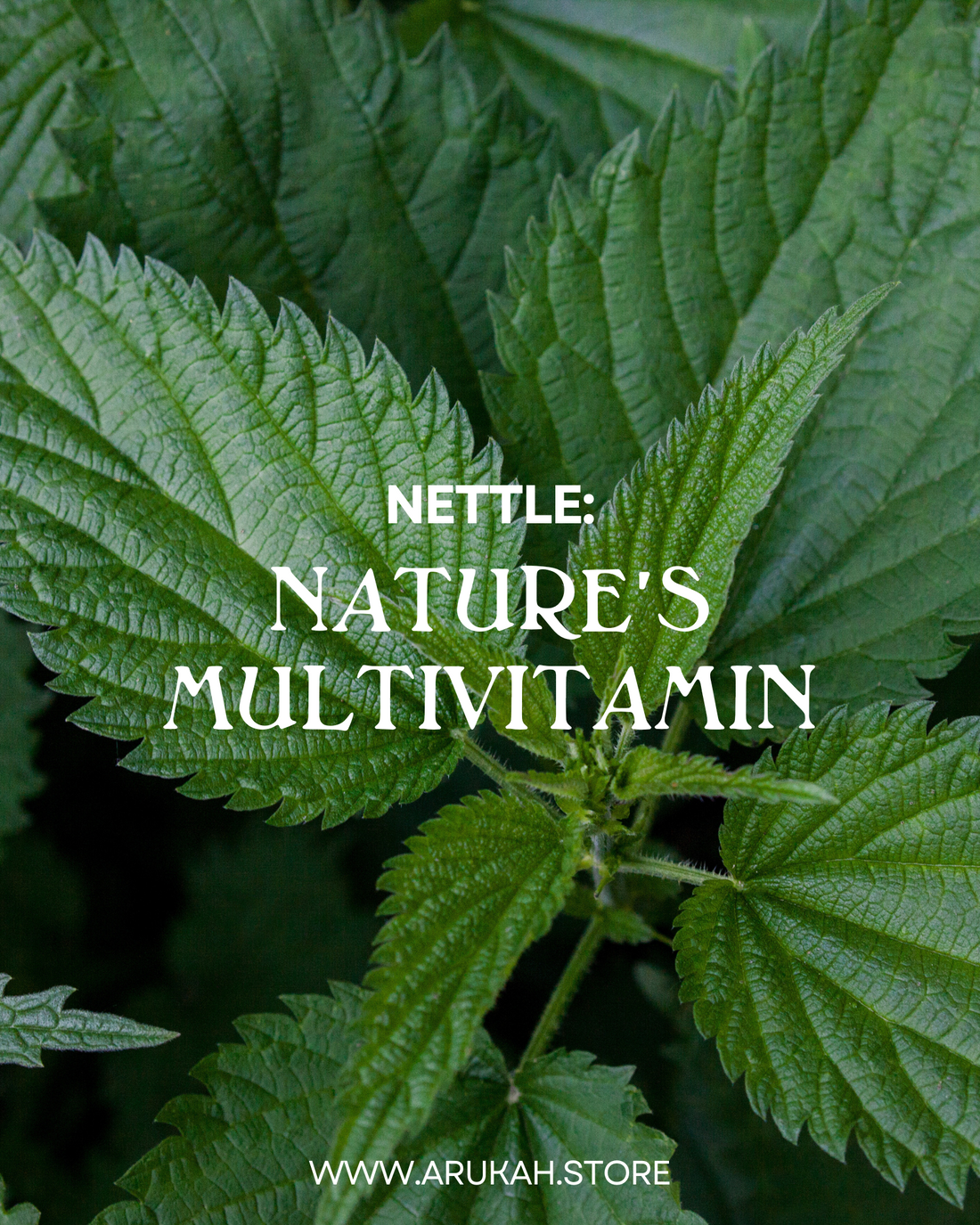
Nature’s Multivitamin: Stinging Nettle
Share
Nettle: The Unsung Hero of Herbal Medicine
Nettle (Urtica dioica), also known as stinging nettle, is an ancient remedy that has been revered for centuries. From ancient Greek physicians to modern herbalists, nettle is celebrated for its incredible range of benefits, making it one of the most versatile plants in herbal medicine. Whether you’re looking to support your overall health or target specific issues, nettle has something to offer everyone.

The Nutritional Powerhouse
One of the reasons nettle is so beloved is because it is packed with nutrients. This humble plant is rich in:
• Vitamins A, C, K, and several B vitamins
• Minerals like iron, calcium, magnesium, and potassium
• Antioxidants like flavonoids, carotenoids, and phenolic acids
• Essential amino acids and plant-based proteins
Nettle is like nature’s multivitamin, making it a fantastic daily supplement for anyone looking to boost their nutrient intake naturally.
Science-Backed Benefits of Nettle
1. Allergy Relief
Nettle has antihistamine properties, making it a go-to remedy for seasonal allergies like hay fever. Studies have shown that nettle extract can help reduce the severity of allergic symptoms by inhibiting pro-inflammatory pathways in the body . It’s a natural way to support your immune system and reduce those itchy, watery eyes and sneezing fits during allergy season.
2. Joint Health and Pain Relief
Nettle has been traditionally used to treat arthritis, gout, and joint pain. Modern research supports this use, with studies showing that nettle can inhibit pro-inflammatory cytokines that contribute to pain and inflammation . Topically applying nettle or drinking nettle tea regularly may help alleviate joint discomfort.
3. Supports Healthy Skin
Nettle is rich in antioxidants, which protect the skin from oxidative stress and environmental damage. Its anti-inflammatory properties also make it beneficial for conditions like eczema and acne. Nettle’s nutrients, such as silica and vitamin C, are also essential for collagen production, promoting skin elasticity and reducing signs of aging.
4. Promotes Hair Growth
Because of its rich mineral profile, especially iron and silica, nettle can be an effective remedy for hair health. It’s often used in hair rinses or as an oral supplement to help strengthen hair, reduce hair loss, and encourage new growth.
5. Blood Sugar and Circulation
Several studies have demonstrated nettle’s ability to help lower blood sugar levels. It may improve insulin sensitivity and support blood sugar balance, making it a helpful herb for those with metabolic disorders . Additionally, nettle’s high iron content supports healthy red blood cell production, making it beneficial for those with anemia or low energy levels.
6. Hormonal Balance and Women’s Health
Nettle is often used to support women’s reproductive health. It can help alleviate symptoms of PMS, regulate menstruation, and even provide relief during menopause by balancing hormones and reducing hot flashes. Its iron-rich profile also makes it a go-to herb for replenishing lost nutrients during menstruation.
How to Use Nettle in Your Daily Life
There are so many ways to incorporate nettle into your health routine:

1. Nettle Tea
One of the simplest ways to enjoy nettle is through a warm cup of tea. It’s gentle, nourishing, and a great way to reap its anti-inflammatory and mineral-rich benefits. Steep 1-2 teaspoons of dried nettle leaves in hot water for 10-15 minutes, strain, and enjoy. Drink up to three cups per day to support general health.
2. Nettle Tincture
For those who prefer a more concentrated form, nettle tinctures provide a convenient way to get all the benefits in just a few drops. You can take nettle tincture directly or add it to water or tea. A common dosage is 1-2 dropperfuls (about 30-60 drops) a few times per day. You can try our Nourished Tincture with Nettle here.
3. Cooking with Fresh or Dried Nettle: A Romanian Tradition
Growing up in Romania, nettle was a staple in many of our traditional dishes, often used in place of spinach. Its earthy flavor and rich nutritional profile make it an ideal addition to soups, stews, and sautés. In fact, nettle has long been a favorite in Romanian kitchens, where it is harvested fresh from the countryside and turned into hearty meals, especially during spring when the young leaves are most tender. You can also use dried nettle leaves and let it rehydrate in your soups and stews.

4. Nettle Infused Oil for hair and skin
Nettle-infused oil is fantastic for skin and hair. You can make your own by infusing dried nettle leaves in a carrier oil (such as olive or jojoba oil) for several weeks, then strain it. Apply this oil to your scalp to stimulate hair growth or to the skin to help with irritation and dryness. We’ve made our hair growth oil with nettle infused in pumpkin seed oil. You can try it here.

A Few Precautions
While nettle is generally considered safe, even for children and pregnancy, it’s always a good idea to consult with a healthcare professional, especially if you are pregnant, breastfeeding, or taking any medications. Some people may experience mild digestive upset when first using nettle, so it’s best to start with small amounts.
Conclusion
Nettle truly is an herb for everyone. Whether you’re looking to support your skin, hair, joint health, or overall well-being, this powerful plant offers a wide array of benefits backed by both traditional use and modern science. Incorporate nettle into your daily routine and experience the difference this nutrient-rich herb can make for your health.
Sources:
• National Library of Medicine (NIH) studies on nettle for seasonal allergies, arthritis, and blood sugar control.
